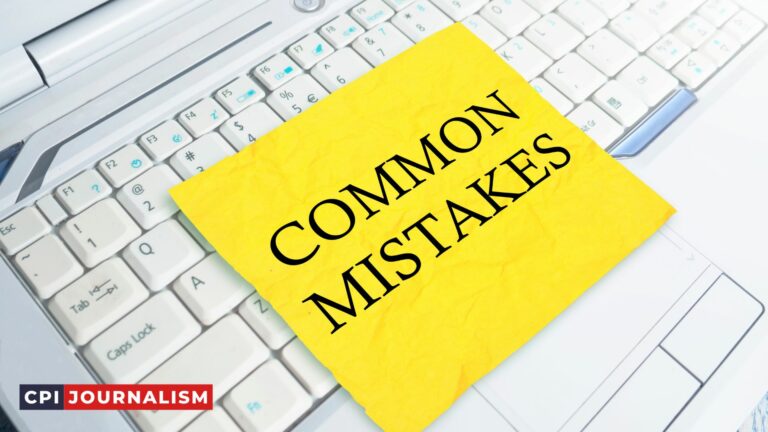What Are The Strategies For Dealing With Pushback And Retaliation When Investigating Sensitive Topics?
As an experienced journalist, I know that investigating sensitive topics can be a challenging and daunting task. It can be especially difficult when you face pushback and retaliation from those who are being investigated.
That’s why I’m here to share some of my knowledge and expertise on the strategies for dealing with pushback and retaliation when investigating sensitive topics.
I have learned from my own experience that it’s essential to approach sensitive topics with caution and preparation. In this article, I will discuss the strategies for dealing with pushback and retaliation when investigating sensitive topics.
A. Definition of Pushback and Retaliation
Pushback and retaliation are two distinct, yet related terms that should be understood by any journalist investigating sensitive topics.
Pushback can be defined as a form of resistance or opposition to someone or something, while retaliation is a response to an action perceived as wrong or harmful.
In the context of investigative journalism, pushback can be seen as attempts to inhibit one’s ability to investigate, while retaliation can be viewed as any kind of retribution taken against the journalist or their work as a result of their investigation.
When it comes to investigating sensitive topics, pushback and retaliation can take many forms. This can include attempts to discredit the journalist, personal attacks, and attempts to intimidate or silence them.
It can also manifest as official forms of pushback, such as legal threats or attempts to block access to certain sources or information. Retaliation can take the form of physical violence, public shaming, or other forms of retribution.
Pushback and retaliation are serious issues for any journalist investigating sensitive topics. It is important for journalists to be aware of the potential for pushback and retaliation and to be prepared to handle it in a safe and effective manner.
B. Overview Of Sensitive Topics
When it comes to investigating sensitive topics, it is essential to understand the dynamics of the situation and the potential for pushback and retaliation.
It’s important to be aware of how the topic may be viewed by those involved, the potential risks associated with the investigation, and the steps that can be taken to protect yourself and your sources.
Sensitive topics can include anything from allegations of political corruption and corporate malfeasance to civil rights violations and human rights abuses.
In any case, it is important to be aware that these topics can be sensitive to those involved, and as such, can lead to pushback and retaliation.
When investigating sensitive topics, it is important to approach the issue with an open mind, while being respectful of those involved.
In addition, it is important to take steps to protect yourself and your sources, such as using secure communication methods and obtaining documentation to back up your claims.
When it comes to pushback and retaliation, it is important to remain calm and professional. It is also important to document any interactions, as this can help to protect you from any potential legal action.
It is also important to be aware of the potential risks associated with the investigation, such as being targeted for harassment or intimidation.
Ultimately, it is important to remember that when investigating sensitive topics, safety and security should be your top priority. With the right strategies and preparation, you can ensure that your investigation is successful and that you and your sources remain protected.
II. Strategies for Dealing with Pushback and Retaliation
When investigating sensitive topics, it is essential that journalists take proactive steps to protect their safety and security.
Here are some strategies for dealing with pushback and retaliation when investigating sensitive topics:
1. Prepare for pushback: Before beginning an investigation, it is important to think about the potential risks associated with the project and how pushback and retaliation may arise.
Make sure to take appropriate safety precautions, such as using secure communication methods and avoiding disclosing too much information about the investigation.
2. Build relationships: Building relationships with sources and contacts is a key element in any successful investigation. When dealing with pushback and retaliation, it is important to create a strong network of sources who can provide support and assistance.
3. Document: Documenting all interactions with potential sources is a vital part of any investigation. This will help to provide evidence should pushback or retaliation arise.
4. Be proactive: Journalists should take proactive steps to protect themselves and their sources. This may include taking legal action, creating a secure environment for sources to communicate, and maintaining a low profile.
5. Seek support: Seeking support from colleagues and mentors is essential when dealing with pushback and retaliation. This may include seeking legal advice and consulting with experienced journalists who have dealt with similar issues.
These strategies can help journalists protect themselves and their sources when investigating sensitive topics. Taking proactive steps to mitigate potential risks can help ensure that journalists can continue to report safely and securely.
A. Establish Clear Guidelines
As an investigative journalist, it is important to establish clear guidelines when dealing with pushback and retaliation when investigating sensitive topics. This will help ensure that the investigation is conducted in a professional and impartial manner.
First and foremost, it is essential to know what issues are considered sensitive and how they should be handled. Some topics may be considered highly sensitive and should be approached with caution and discretion.
It is crucial to clarify the scope of the investigation and the boundaries of the story. Additionally, the journalist should determine the sources that will be used and how they will be accessed.
It is also important to consider the potential impact the story may have on any parties involved. The journalist should consider the consequences of their investigation and be prepared for any repercussions.
Finally, the journalist should be aware of any laws or regulations that may apply to their investigation. This will help them to ensure that their work is conducted in a legal and ethical manner.
By establishing clear guidelines, journalists can be better prepared to deal with pushback and retaliation when investigating sensitive topics. This will help ensure that the story is handled in a professional and impartial manner.
1. Set Expectations
When investigating sensitive topics, it is important to set expectations with all stakeholders involved in the process. This will help ensure that everyone is aware of their roles and responsibilities and what is expected of them throughout the course of the investigation.
For example, when interviewing sources, it is important to clearly state the purpose of the investigation, the timeline for the investigation, and the expected outcomes.
This will help ensure that the source is aware of the implications of participating in the investigation and the potential for pushback or retaliation.
In addition, it is important to set expectations with the publication or news outlet that is conducting the investigation.
This includes providing a clear timeline for the investigation, as well as any restrictions or limitations that the publication may have in terms of publishing certain information.
This will help to ensure that there are no surprises or misunderstandings during the course of the investigation.
Finally, it is important to set expectations with the readers or viewers of the investigation. This includes providing a clear explanation of the purpose of the investigation, as well as any potential risks or rewards associated with the investigation.
This will help ensure that readers are aware of the potential consequences of participating in the investigation.
2. Define the Scope of the Investigation
When investigating sensitive topics, it’s important to clearly define the scope of the investigation from the outset. This means deciding what questions you will be asking, who you need to speak to, and what documents you need to review.
It’s also important to consider the sources you will be relying on, as well as secondary sources that may provide additional information.
Additionally, it’s essential to understand the timeframe for the investigation. This means considering when you will begin the investigation, how long it will take to complete, and when the report or article will be published.
Additionally, it’s important to set a deadline for when the investigation must be complete in order to ensure that the information remains timely and relevant.
By defining the scope of the investigation from the beginning, you can ensure that you have a clear understanding of what you are trying to learn and the resources you need to achieve your goal. This will also enable you to plan for any potential pushback or retaliation you may encounter along the way.
3. Establish a Chain of Command
When investigating sensitive topics, it is important to establish a chain of command to ensure that the investigation is conducted in a professional and organized manner.
The chain of command should include the lead investigator, the subject matter experts, the editors, and the legal team. This will ensure that everyone involved in the investigation is aware of their role and that all decisions are documented and discussed.
The lead investigator should be the point person who takes the lead on the investigation and is responsible for ensuring that all information is accurately collected and documented.
The subject matter experts should be consulted throughout the investigation in order to ensure accuracy and to provide insight into the topic being investigated.
The editors should provide oversight and guidance in order to ensure that the investigation is conducted in a professional manner and that the resulting article is written in a clear and concise manner.
Finally, the legal team should be consulted for any legal advice that may be needed throughout the course of the investigation.
By establishing a clear chain of command, the team will be able to more effectively investigate the sensitive topic and ensure that all of the necessary steps are taken to protect the integrity of the investigation.
This will also help to ensure that any pushback or retaliation that arises is addressed in an appropriate and timely manner.
4. Communicate the Guidelines to All Parties
Once the strategies for dealing with pushback and retaliation when investigating sensitive topics have been established, it is important to communicate these guidelines to all parties involved.
This should include the investigative team, editors, managers, stakeholders, and any other individuals who may be affected by the investigation.
Clear communication about the parameters of the investigation will help ensure that all parties understand the expectations and objectives of the investigation.
It is important that everyone involved in the investigation is aware of the potential risks that can come with investigating sensitive topics and the strategies in place to protect them.
It is also important to communicate the expectations of all parties: the investigative team should be provided with clear guidance and expectations regarding the scope of the investigation, while editors and managers should be aware of the parameters of the team’s work and any potential risks associated with it.
Finally, stakeholders should be informed of the potential outcomes and implications of the investigation and any strategies in place to protect their interests.
Clear communication and expectations can help ensure that everyone involved in the investigation is on the same page and that each party has an understanding of the risks and rewards associated with the investigation.
B. Prepare for Pushback
When investigating sensitive topics, it’s important to be prepared for pushback and retaliation.
Here are some strategies you can use to protect yourself and your sources.
1. Know your rights: Familiarize yourself with the legal protections afforded to journalists and sources. This will help you identify potential risks and prepare for pushback.
2. Research the issue: Do your homework. Research the issue you’re investigating, the parties involved, and any potential retaliatory tactics they may use.
3. Use multiple sources: Always use multiple sources to verify facts. This will help ensure accuracy and reduce the risk of pushback.
4. Protect your sources: Ensure that your sources remain anonymous. Use encrypted communication methods to protect their identities.
5. Record interactions: If you’re meeting with a potential source, record the conversation. This will help protect you in case of a dispute.
6. Document everything: Keep records of all your interactions, correspondence, and research. This will provide evidence of the work you’ve done and help protect you if pushback occurs.
7. Prepare a contingency plan: Think ahead. Have a plan in place in case of pushback or retaliation. This could include reaching out to attorneys, organizations, or other media outlets for assistance.
By following these strategies, you can be better prepared for pushback and retaliation when investigating sensitive topics.
1. Anticipate Potential Pushback
As an experienced journalist, one of the most important strategies for dealing with pushback and retaliation when investigating sensitive topics is to anticipate potential pushback.
It is important to consider the interests of the people or organizations you are investigating, and how they might respond to your questions and discoveries.
Understanding the potential reactions and pushback will help you prepare for them, and remain safe and protected while conducting your investigation.
To anticipate potential pushback, consider the people or organizations you are investigating, their interests and motivations, and their capacity to retaliate. Understand the power dynamics and potential risks associated with your investigation.
Ask yourself: Who might be negatively affected by the story? Who has the power to retaliate? How have similar stories been received in the past?
By anticipating potential pushback, you can be prepared for whatever comes your way, and can protect yourself against retaliation. Make sure to establish relationships with trusted sources and create a support network of colleagues who are familiar with the subject matter.
Additionally, consider building a legal team to protect you from any potential legal issues, and develop a safety plan in case of retaliation or threats.
2. Develop a Plan of Action
When investigating sensitive topics, it is important to develop a plan of action that will help you to effectively handle pushback and retaliation.
This plan should include the following steps:
1. Research: Before beginning your investigation, it is important to thoroughly research the topic. This will help you to understand the nuances of the issue, the players involved, and any potential obstacles that you may face.
2. Develop a Network: Developing a strong network of reliable sources can help you to get the information you need to back up your story. This network should include both primary sources (those directly involved in the story) and secondary sources (those who have knowledge of the story).
3. Prepare for Pushback and Retaliation: As you are researching, be sure to keep in mind any potential pushback or retaliation that you may face. Have a plan in place for how you will respond if you encounter any pushback or retaliation.
4. Document Everything: Document all of your research, interviews, and conversations. This will help you to keep track of the progress of your investigation and will provide evidence to support your story.
5. Take Precautions: When investigating sensitive topics, it is important to take precautions to ensure your safety. Be sure to communicate only through secure means and take precautions to protect your identity.
By following these steps, you will be better prepared to handle pushback and retaliation when investigating sensitive topics. Being prepared and having a plan of action will help you to effectively and safely investigate sensitive topics and tell important stories.
3. Utilize Resources
When investigating sensitive topics, it is important to fully utilize all available resources. With sensitive topics, often comes pushback or retaliation, so it is best to be as prepared as possible before embarking on the investigation.
First and foremost, it is important to reach out to knowledgeable sources. These sources should be able to provide insight into the situation and can serve as a sounding board for ideas and strategies. Additionally, research is essential.
Journalists should be sure to conduct thorough fact-checking and background research to ensure the accuracy of their reporting.
Additionally, there are several resources available to journalists that can help protect them while they investigate sensitive topics. One such resource is the Freedom of the Press Foundation, which provides both legal and financial support to journalists.
There are also media organizations, such as the Reporters Committee for Freedom of the Press, which provide resources and advice on legal matters related to reporting.
Finally, journalists should consider joining a professional organization, such as the Society of Professional Journalists, which provides support and a network of other journalists who can offer advice and guidance.
By utilizing these resources, journalists can increase their awareness of potential risks and be better prepared to face any pushback or retaliation.
Additionally, these resources can provide journalists with the support and guidance they need to conduct their investigations safely and effectively.
4. Consider Alternative Solutions
When investigating sensitive topics, it is important to consider alternative solutions to dealing with pushback and retaliation.
First, journalists should always consider the potential for legal protection, such as filing for a restraining order or working with an attorney to understand the potential legal consequences of the story.
Second, journalists should also consider the potential for the story to be published without identifying the sources. Anonymity can be achieved through a variety of methods, including pseudonyms and other methods of obfuscating the identity of sources.
Third, journalists should also consider the potential for collaboration with other media outlets. This can help spread the burden of pushback and retaliation, while also increasing the potential impact of the story.
Journalists should also consider the potential for off-the-record interviews, which can be used to gather information without the source’s identity being revealed.
Finally, journalists should also consider the potential for public advocacy. This can be done through public events, such as rallies and press conferences, as well as through social media.
This can be an effective tool for raising awareness about the story and generating public support for its publication.
C. Respond to Pushback
When dealing with pushback and retaliation, it is important to remain professional and maintain a level head.
As an experienced journalist, I have found it helpful to follow the following steps when responding to pushback:
1. Acknowledge the pushback. It is important to acknowledge the pushback, even if you don’t agree with it. Show respect for the other person’s point of view and take the time to understand why they are pushing back.
2. Remain calm. In any situation, it is important to remain calm and professional. If the situation becomes heated, take a step back and take some time to collect your thoughts before responding.
3. Ask questions. Asking questions can help you understand the other person’s point of view and can help de-escalate the situation.
4. Reiterate your position. Once you have heard the other person’s point of view, it is important to state your position clearly and calmly.
5. Offer solutions. If possible, it is helpful to offer solutions that can help address the other person’s concerns.
6. Walk away. If the situation cannot be resolved, it is important to know when to walk away. This can help prevent the situation from escalating further.
By following these steps, it is possible to respond to pushback in a professional manner. It is important to remain calm and collected when dealing with pushback and retaliation, and to remember that the goal is to reach a resolution that is mutually beneficial.
1. Remain Calm
As an experienced journalist, I can tell you that one of the most important strategies for dealing with pushback and retaliation when investigating sensitive topics is to remain calm.
It’s easy to get caught up in the emotion of the situation, but this can lead to costly mistakes. Instead, take a deep breath and focus on the facts. Ask yourself what the goal is and how you can reach it in the most effective way.
Staying calm is also important when it comes to communicating with people who may be hostile to your investigation. Try to remain professional and polite at all times, even if the other person is not.
Speak in a clear and even tone and try to avoid escalating the situation. It is important to remember that even if the other person is being difficult, they are likely more interested in protecting their own interests than trying to harm yours.
Finally, remain mindful of your own safety. If you feel threatened or if the situation becomes volatile, take the necessary steps to ensure your safety. This may include leaving the premises, contacting local authorities, or seeking legal counsel.
2. Listen and Acknowledge
When it comes to investigating sensitive topics, it is important to listen and acknowledge the feelings of those you are interviewing or speaking with.
It is essential that you create an environment where the people you are engaging with feel heard and respected. It is essential to be open and non-judgmental when listening to the perspectives of each individual involved in the investigation.
This could mean taking the time to ask follow-up questions after each response and allowing the interviewee to express their feelings and opinions fully.
This will help to build trust and respect between you and the people you are engaging with, which can be beneficial when it comes to pushing back against any form of retaliation.
It is also important to ensure that you are understanding the perspectives of all parties involved. In some cases, this could mean looking into the history or background of the situation to gain a better understanding.
This could mean researching any potential legal issues, cultural contexts, or other factors that could be relevant to the situation.
Finally, it is important to acknowledge any potential risks or dangers associated with the investigation. This could mean considering how the investigation could affect the safety and security of those involved, as well as any potential consequences that could arise.
This is an important step to take as it will help to ensure that the investigation is conducted safely and responsibly.
3. Address Concerns
When investigating sensitive topics, it is important to be aware of the potential for pushback and retaliation. As such, it is important for journalists to take steps to minimize their risk.
Here are some strategies for addressing concerns:
1. Understand Your Rights: Journalists should be familiar with the laws and regulations governing their work. This includes both federal and state laws, as well as any industry-specific regulations. Knowing the law can help protect you from any potential legal action.
2. Stay Vigilant: When dealing with sensitive topics, it is important to remain vigilant. Journalists should be aware of their surroundings and take extra precautions when in potentially dangerous situations. Staying vigilant can help reduce the risk of retaliation or pushback.
3. Don’t Provoke: Journalists should be aware of the potential for retaliation and take steps to avoid provoking people. This includes avoiding inflammatory language and refraining from making personal attacks.
4. Protect Yourself: Journalists should take steps to protect their safety and privacy. This includes keeping all documents related to the investigation confidential, using secure communication channels, and avoiding contact with any individuals who may seek to retaliate.
5. Seek Legal Advice: Journalists should consider consulting a lawyer for legal advice if they believe they may be at risk for pushback or retaliation. Having an experienced lawyer on their side can be invaluable in protecting their rights.
By following these strategies, journalists can help reduce their risk of pushback and retaliation when investigating sensitive topics. It is important to take the necessary precautions to protect yourself and your work.
4. Reiterate Guidelines
When dealing with pushback and retaliation when investigating sensitive topics, it is important to reiterate the guidelines for journalistic practices.
Here are the key points to keep in mind:
1. Maintain the highest standards of ethical journalism. This includes maintaining objectivity, accuracy, fairness, and honesty when reporting the story.
2. Respect the confidentiality of sources. Do not reveal the identity of sources unless they have given explicit permission to do so.
3. Be aware of the legal implications of your reporting. Make sure to be familiar with laws that may affect the story.
4. Be aware of the potential for pushback or retaliation. Be prepared to respond to any accusations with facts and evidence.
5. Seek out multiple sources for the story. This will help ensure accuracy and completeness.
6. Document all sources and information. This will help to ensure that you have an accurate record of the story.
7. Use the proper channels to publish your story. Make sure to adhere to the publication’s guidelines.
By following these guidelines, journalists can ensure that they are adhering to best practices when investigating sensitive topics.
5. Offer Support
As a journalist, it is essential to provide support to sources that are dealing with pushback and retaliation when investigating sensitive topics.
This can help to create an atmosphere of mutual trust between the journalist and their sources, and can also help to protect the source from further backlash.
The first step in offering support is to ensure that the source is aware of their rights and the legal protections that are available to them.
This can include understanding their rights under whistleblower and anti-retaliation laws, as well as understanding the implications of any gag orders or other restrictions that may be put in place by the source’s employer or other parties.
In addition, it is important to provide emotional support to the source. This can include offering to listen to the source’s concerns and providing reassurance that their story is being taken seriously and that they are not alone.
It is also beneficial to provide the source with resources, such as legal advice, mental health support, and other forms of assistance that they may need.
Finally, it is important to ensure that the source is aware of the potential risks of their involvement in the investigation.
This includes ensuring that they are aware of the potential consequences of their testimony, such as the possibility of career damage, legal repercussions, or social ostracism.
It is also important to make sure that the source is comfortable with the terms of any confidentiality agreement or other agreement that they may be asked to sign.
By offering support to sources dealing with pushback and retaliation, journalists can help to create a safe and supportive environment in which sources can provide important information without fear of reprisal. This is essential for ensuring that sensitive stories can be told without fear of repercussions.
D. Follow Up
When investigating sensitive topics, it is essential to establish a system of follow up in order to ensure that any potential pushback or retaliation is addressed in a timely manner.
Follow up should be conducted at regular intervals to ensure that any necessary action is taken and that the process is completed in a satisfactory manner.
The follow-up should include:
1. Regular contact with the individuals involved to ensure that any issues are being addressed.
2. Regular review of any changes that may have been made to the original plan to ensure that it is still appropriate.
3. Contact with any other relevant parties to ensure that any necessary steps are being taken to address any pushback or retaliation.
4. Regular updates to the team responsible for the investigation to ensure that any changes or progress is being tracked and reported.
5. Regular communication with any other relevant parties to ensure that any concerns or questions are being addressed in a timely manner.
It is important to note that follow up should not be seen as an afterthought, but rather as an essential part of the process.
Follow up should be done regularly throughout the process in order to ensure that any issues are addressed in a timely manner and that the investigation is completed in a satisfactory manner.
1. Document the Process
As an experienced journalist, I can tell you that when investigating sensitive topics, the most important thing you can do is document the process.
This means that you should keep detailed notes and records of all conversations, meetings, and interviews related to the investigation. Additionally, if you are using any online sources, make sure to save any screenshots and posts you come across.
Documenting the process helps to ensure that you have a thorough and accurate record of the investigation and can be used as a reference should any questions or issues arise.
It also helps to establish a timeline and sequence of events, so that you can more easily spot any discrepancies or inconsistencies.
Finally, it is important to remember that the process of documenting your investigation is not only beneficial for yourself, but also for other journalists and those involved in the investigation. By keeping a detailed record, you are creating a valuable resource for others to use and learn from.
2. Monitor Progress
As a journalist investigating sensitive topics, it is important to monitor the progress of your investigation. This ensures that your sources and methods are not compromised and that the safety of everyone involved is protected.
Monitoring progress also allows you to be aware of any pushback or retaliation that may be occurring as a result of your investigation. It is important to document any attempts to intimidate or silence you, as well as any other acts of retaliation.
To monitor progress, it is important to establish a system for tracking events, conversations, and other information related to your investigation. This system can include notes, recordings, emails, and other forms of documentation.
You should also be sure to consult with trusted sources from time to time to ensure that your investigation is still on track. This can help you to identify any potential problems so that they can be addressed quickly.
Finally, it is important to keep your sources informed of your progress. This helps to ensure that they are aware of any risks associated with your investigation, as well as any potential pushback or retaliation that may occur.
3. Take Action if Necessary
If, after researching and investigating sensitive topics, you have experienced pushback or retaliation, it is important to take action. Depending on the severity of the situation, it may be necessary to take legal action to protect yourself and your sources.
First, it is important to document the circumstances that led to the pushback or retaliation. Keep a detailed record of any conversations or emails that may have hinted at threats or intimidation. This can help to support a legal case.
Next, it is important to reach out to your employer or another organization that can provide support. They may be able to help you navigate the legal system or provide resources to help protect you and your sources.
If the pushback or retaliation is particularly severe, it may be necessary to take legal action. This could include filing a complaint with the relevant government agency or even filing a lawsuit. In such cases, it is important to consult with a lawyer to ensure that your rights are properly protected.
Finally, it is important to be aware of any laws that may protect you from pushback or retaliation. For example, the US has laws such as the Whistleblower Protection Act that provide protection for those who report wrongdoing.
By taking the appropriate steps to document the situation, seeking support from your employer or other organizations, and understanding the relevant laws, you can ensure that you are properly protected while investigating sensitive topics.
4. Provide Feedback
As an experienced journalist, I am often asked how to deal with pushback and retaliation when investigating sensitive topics.
The answer is that it is essential to provide feedback to those who are pushing back or retaliating. This feedback should be respectful and professional and should take into account the individual’s feelings and concerns.
When providing feedback, it is important to clarify the expectations you have for the individual. Explain why it is important to investigate the sensitive topic and provide examples of how the issue affects the community.
Make sure to be specific and direct with your feedback, as this will ensure that the individual understands what is expected of them.
It is also important to acknowledge the individual’s feelings and concerns. Let them know that you understand their point of view and that you are willing to hear them out.
Doing so will help to build trust and create an atmosphere of respect and understanding.
Finally, it is important to provide a clear and concise plan of action. Explain the steps that will be taken to ensure the safety of everyone involved and provide a timeline for when the investigation will be completed.
By providing feedback in a respectful and professional manner, it is possible to gain the trust of those who are pushing back or retaliating. Doing so will help to ensure that the investigation is conducted in the most effective way possible.
III. Conclusion
Investigating sensitive topics can be a challenging prospect, but with the right strategies in place, it can be a rewarding experience.
Ultimately, dealing with pushback and retaliation is an essential part of the process. By proactively planning ahead and understanding the potential risks, journalists can be better equipped to handle any pushback or retaliation they may face.
The key strategies for dealing with pushback and retaliation include: understanding the risks associated with the topic, developing a safety plan and a support system, taking proactive measures to protect yourself and your sources, and remaining flexible and open to alternative solutions.
Ultimately, the goal is to ensure that the investigation is completed in a safe and effective manner.
It is important to remember that when dealing with pushback and retaliation, the safety of the journalist and their sources should always be the top priority.
By taking the proper precautions and utilizing the recommended strategies, journalists can be better equipped to handle pushback and retaliation when investigating sensitive topics.
A. Summary of Strategies
1. Prepare for pushback: As an investigative journalist, it is important to anticipate that pushback and retaliation may be a consequence of your work. Prepare for pushback by researching the topic thoroughly and having a plan of action in place for handling potential responses.
2. Maintain professional relationships: When interviewing subjects, maintain a professional relationship by remaining unbiased, respecting the subject’s opinion, and refraining from making assumptions or judgments.
3. Protect yourself: It is important to protect yourself by ensuring that all communication with subjects is documented and that you have a plan in place for managing hostile reactions.
4. Establish trust: Establishing trust with subjects is essential for gaining access to sensitive information. Use active listening and build empathy to create an environment of trust.
5. Utilize resources: Utilize resources such as the Freedom of Information Act, public records, and social media to access information.
6. Remain ethical: As an investigative journalist, it is important to remain ethical and adhere to the Society of Professional Journalists code of ethics.
7. Document everything: Document all communication with subjects, as well as all evidence gathered throughout the process.
8. Seek help: If pushback or retaliation becomes overwhelming, don’t hesitate to seek help from colleagues or legal counsel.
B. Final Thoughts
As an experienced journalist, I can tell you that dealing with pushback and retaliation when investigating sensitive topics can be a stressful and daunting task.
However, by following the strategies outlined above and being prepared for the challenges ahead, you can be successful in your investigations and uncover important stories.
It is important to remember that tackling sensitive topics is not for the faint of heart. You will face pushback and criticism from people who do not want the truth to be revealed.
It is essential to remain focused and committed to the investigation, regardless of the criticism you may receive.
Also, it is important to remember to be respectful and courteous when dealing with all parties involved in the investigation. Even if you do not agree with the opposing views, it is important to maintain a professional attitude.
Finally, it is essential to create an environment where everyone feels safe and comfortable. This is key to a successful investigation, as it allows people to feel secure enough to come forward with valuable information.
By following these strategies, you can ensure that you are prepared to successfully investigate sensitive topics. Good luck!







